Sambo (literally “self-defense without weapons”) is a Soviet martial art and combat sport, including both physical and moral pedagogy.
Sambo originated in the 1920s in Soviet Russia. It was created on the basis of national wrestling and with the use of judo skills. Sambo is akin to free and Greco-Roman wrestling.
The pioneers of sambo were Viktor Spiridonov, Vasili Oshchepkov and Anatoly Kharlampiyev. They independently perfected and adapted the techniques of unarmed combat.

Viktor Spiridonov
http://izsambo.by

Vasili Oshchepkov
http://izsambo.by

Anatoly Kharlampiyev
http://izsambo.by
On November 16, 1938, it was recognized as an official sport. This date is regarded as the “birthday” of sambo wrestling.

Koch, the Armenian native wrestling
Book Чемпионат мира по борьбе
Sambo has about five thousand defense and attacking techniques, taken from native wrestling styles and foreign martial arts: Azerbaijani Gyulesh, Armenian Koch, Kazakh Kures, Moldovan Trynty, Finnish, French and American wrestling, Swiss wrestling, Japanese judo and sumo.
In November 1939, the first individual championship in sambo took place in Leningrad and brought together 56 wrestlers.
In 1946, a year after the end of the Great Patriotic War, championships were resumed in the USSR.
In the 1960s, thanks to successful performances of Soviet wrestlers, sambo gained popularity abroad. Having changed from Sambo jackets into Japanese kimonos, the Soviet Union wrestlers won the pioneers of judo. Oleg Stepanov, Parnaoz Chikvilade, Aron Bogolyubov, Anzor Kiknade won bronze medals at the 1964 Olympic Games in Tokyo.
In 1966, the Congress of the International Amateur Wrestling Federation (FILA – Fédération Internationale des Luttes Associées) officially recognized sambo as an international sport.
In 1972, the first Open Championship of Europe took place. The 1973 World Championship was attended by athletes from 11 countries.
In 1977, sambo wrestlers first performed at the Pan American Games; in the same year the first World Cup in sambo was played. In 1979, the first World Championship among youth, and two years later the first Women's World Championship were conducted.
In 1968 in Moscow, a group of women's sambo under the direction of the Honored Trainer of the RSFSR Lev Turin was organized at the 17th school in Mira Avenue.

Chairman of the FILA Sambo Commission Jacob (United Kingdom) visiting the trainees of Lev Turin. Moscow, 1969
Book Самбо для женщин
Gradually, women's Soviet sambo began to win positions in many countries, and, finally, gained universal recognition.
In 1982, the first national championships among women in Venezuela, Spain, the USA and Argentina were held.
In 1983, the first Spanish-American tournament took place in Madrid. In the same year, ladies made their debut at the IX Pan-American Games. Since 1984, the European and World Championships have been held.
Despite the fact that this sport originated in Russia, only in 1987 the First All-Russian Sambo Tournament was officially held. The event brought together representatives from 17 regions of the RSFSR.
In 1989, the first USSR Women's Sambo Championship was held.
In the BSSR, sambo began its way in the late 1930s. The first sports sections appeared in Minsk, Gomel, Bobruisk and Borisov.
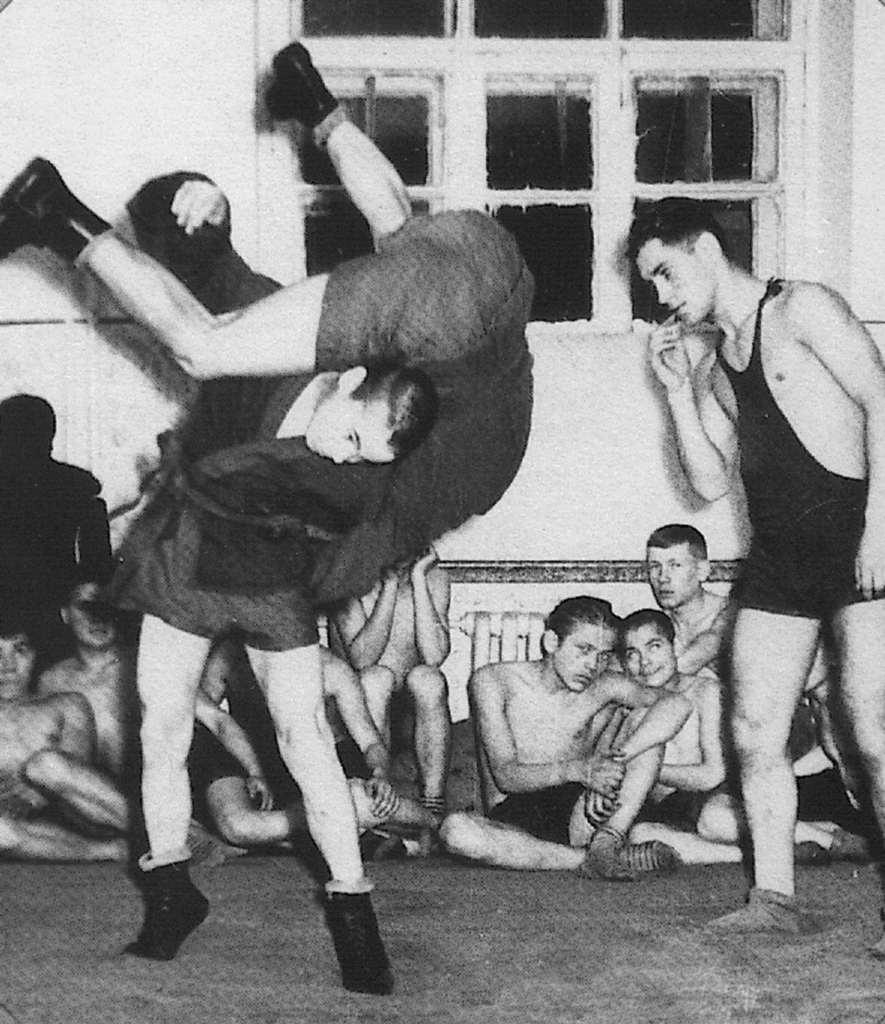
Coach Vitaly Senko with his first trainees
Magazine Самбо – наша жизнь
After the Great Patriotic War, Mikhail Liunas and Vladilen Zhogin were engaged in developing sambo in Belarus. In 1946, Liunas established a section of sambo wrestlers at the Dynamo Society in Minsk and organized training for all militia officers. In 1952, Zhogin organized sambo sections at Minsk Automobile Plant and at the Institute of Agricultural Mechanization. Since the late 1950s, Vitaly Senko, Semyon Tumanov and Anatoly Koryago, the Honored Coaches of the USSR and the BSSR, had successfully continued his work.
The first personal championship of the BSSR was held in 1949 in Minsk. Minsk residents Grigory Yukhnovets, Alexey Babinok, Nikolai Volchkov, Vasily Belkov, Nikolay Antipov and Mogilev resident Nikolai Tolkachev became the winners.
Vladimir Sheiko and Semyon Lysafin won the first medals at the USSR Championships. In 1967, the Belarusian national team became the fourth at the USSR team championship.
Valery Kardapolov and Anatoly Zhulanov won bronze medals at the final competitions of the 1975 Spartakiad of the Peoples of the USSR. In the same year, Kardapolov became the silver medalist of the World Sambo Championship.
In 1975, the Honored Coach of Turkmenistan, Nikolai Makarov, became the senior coach of the Belarusian national team. At the end of 1975, the national team of the BSSR becomes the third at the USSR Cup.

Magomed Ramazanov, Anton Novik (standing), Valery Karakulko, Victor Bukhval with Honored Coach of the Republic of Belarus Yevgeny Ageychik
Magazine Самбо – наша жизнь
At the 1979 Summer Games of the Peoples of the USSR in, the Belarusian national team for the first time ranked among the top three teams, and the 18-year-old Vitaly Pesnyak won the competitions.
Since 1980, the senior coach of the national team of Belarus had been the assistant to Makarov, Julian Novik. Under his leadership, the national team had become a real forge of world and European champions.
Thus, the highest achievements of the Belarusian sambo wrestlers during the Soviet period are:
- Vladimir Yaprintsev, four-time world champion;
- Magomed Ramazanov, world champion, European champion, World Cup winner;
- Victor Bukhval, world champion;
- Mikhail Baranov, two-time world champion.
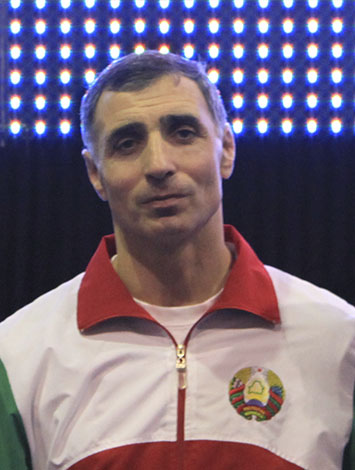
Magomed Ramazanov
http://izsambo.by

Vladimir Yaprintsev
http://izsambo.by

Mikhail Baranov
http://izsambo.by

Victor Bukhval
http://izsambo.by
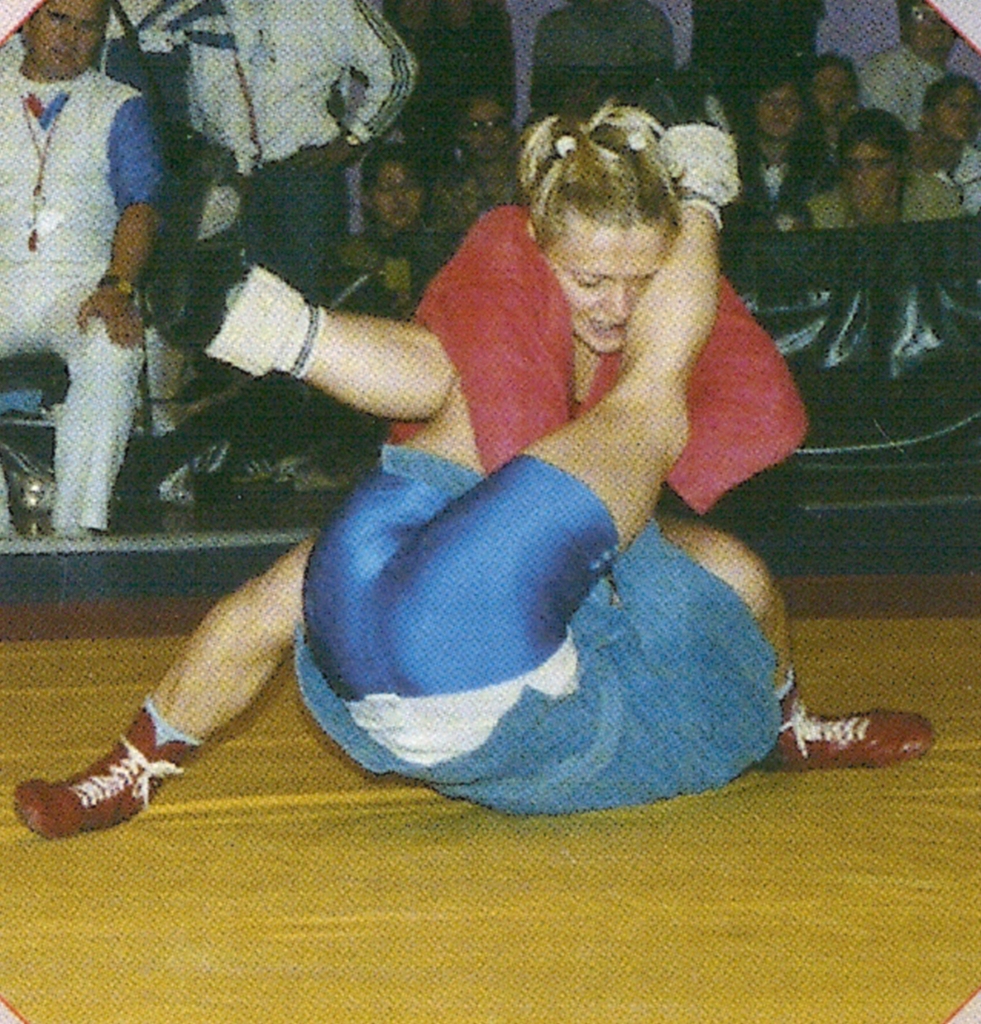
Belarusian ten-time world champion Tatyana Moskvina fighting n the ring
Magazine Самбо – наша жизнь
Since the 1980s, coaches Semyon Lisafin, Sergey Saveliev (Honored Judo Coach of the BSSR) and Ernst Mitskevich (Honored Judo Trainer of the USSR and Honored Sambo Coach of the BSSR) had been engaged in preparing the women's team of the Republic of Belarus.
Since the 1990s, Tatyana Moskvina (10 times world champion, 4 times European champion and 3 times winner of the World Cup), Veronika Kozlovskaya (7 times world and European champion), Galina Michal (Savenkova ), Svetlana Volnova, Lyudmila Tarnogurskaya, Inna Toropeeva, Inna Kazantseva, Svetlana Selikhanova, Angelica Potapova, and Lyudmila Bedritskaya had been the medal winners in sambo.
For significant achievements of the Belarusian sambo wrestlers, our country was granted the right to host the 1992 World Cup and the 1995 European Championship.
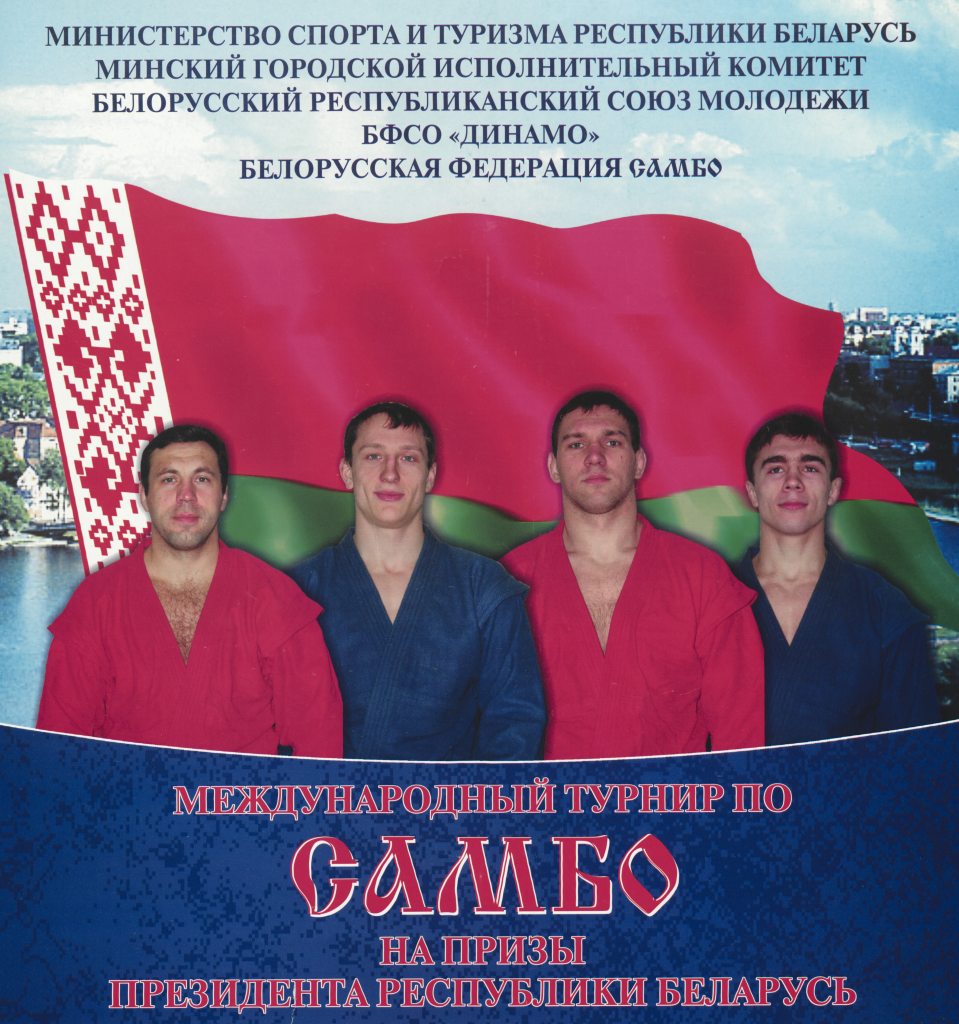
Poster Международный турнир по самбо на призы президента Республики Беларусь
Since 1996, the big event for sambo wrestlers of our country and the whole world has been the Sambo Open Championship of the Republic of Belarus for the prizes of the President of the Republic of Belarus. Every year, the championship has received increasing recognition among sambo wrestlers from all over the world, and for several years it has been the World Cup stage. During this period, representatives of 22 countries had been fought in Belarusian rings.
In 1996, the Honored Coach of Belarus, Vyacheslav Kot, was appointed the head coach of the national team of the Republic of Belarus in sambo. He has trained and prepared for competitions many generations of sambo wrestlers. Today some of them represent our country.
The most significant successes have been achieved by the Belarusian sambo wrestlers:
- Tatyana Moskvina, ten-time world champion, four-time European champion and three-time World Cup winner;
- Veronika Kozlovskaya, seven-time world champion and seven-time European champion;
- Dmitry Bazylev, six-time world champion;
- Natik Bagirov, four-time world champion.
Despite the fact that they have completed their careers, they share their sports experience with young athletes.
Veterans of the national team of Belarus continue to perform successfully in the ring:
- Yuri Rybak, three-time world champion;
- Andrey Kazusenyok, three-time world champion;
- Julia Borisik, therr-time world champion;
- Anastasia Arkhipova (Leshkova), three-time world champion;
- Ekaterina Prokopenko, two-time world champion.
Tatyana Matsko from Grodno has no equals in the international arena for four years. She won the first European Games in Baku, and then won the World Championships three times in 2016, 2017 and 2018.
The best Belarusian sambo wrestlers of the present
In 2018, the International Olympic Committee (IOC) temporarily recognized sambo as an Olympic sport. In one of the interviews, Vyacheslav Kot, the head coach of the Belarusian national sambo team, expressed the hope that this sport would be included in the program of the Olympic Games, since all the conditions set by the IOC had already been fulfilled. Perhaps this will significantly increase the medal chances of Belarus, since our sambo wrestlers are among the best in the world.
At the 2018 World Championships, Belarusian athletes won 12 awards: two gold, five silver and five bronze medals.
The inclusion of sambo in the program of the Second European Games shows that this kind of martial arts is still popular in European countries and has a good prospect to become an Olympic sport in the near future.
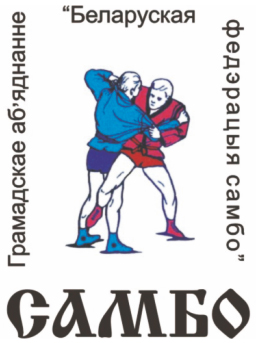
The Belarusian Sambo Federation
http://triple.by
In 1966, the Sambo Federation of the BSSR was organized; Vitaly Senko was elected the chairman.
The Belarusian Sambo Federation is a member of the International Sambo Federation (FIAS (fr.) Fédération Internationale Amateur de Sambo), a non-governmental public non-profit organization uniting national sambo federations. FIAS is the only recognized international organization leading the development of sambo in the world. On June 13, 1984, FIAS left the United World Wrestling (Fédération Internationale des Luttes Associées, FILA) and was recognized as an independent international sports federation.
The Belarusian Sambo Federation page on the website of the International Sambo FederationThe national sambo team of the Republic of Belarus at the Second European Games
The International Sambo Competition Rules
Belarusian sambo wrestlers represented our country with honor at the first European Championship in Baku. Our athletes competed for awards in seven weight categories and showed the maximum result: two gold medals, two silver and three bronze medals. As always, ladies made their contribution to the overall success.

Belarusian team at the First European Games in Baku
Magazine Наш спорт
Men
Gold medals:
Stepan Popov, weight category up to 74 kg

Stepan Popov
http://izsambo.by
A Belarusian sambo wrestler; the world champion in sambo, European champion in sambo; the Honored Master of Sports of the Republic of Belarus; the athlete-instructor of the national team.
Born on June 11, 1984 in Lepel, Vitebsk Region, Republic of Belarus.
Silver medals:
Andrei Kazysenok, weight category up to 90 kg

Andrei Kazysenok
http://www.noc.by
A three-time world champion in sambo, four-time champion of Europe; a Belarusian sambo and judo wrestler, member of the national team of Belarus since the mid-2000s; the bronze medalist of the World Championship and European champion in judo; a participant of the Summer Olympic Games in Beijing; the Honored Master of Sports of the Republic of Belarus.
Born on January 15, 1984 in Bobruisk.
Bronze medals:
Vladislav Burdz, weight category up to 57 kg

Vladislav Burdz
http://www.noc.by
He was engage in sambo wrestling in early childhood, trained at the Republican School of Olympic Reserve and at the Republican Center for Physical Culture and Sports in Mogilev and Minsk. His coaches were Viktor Nazarov and Ernst Mitskevich.
Born on May 15, 1996 in Mogilev Region.
Yuri Rybak, weight category up to 100 kg
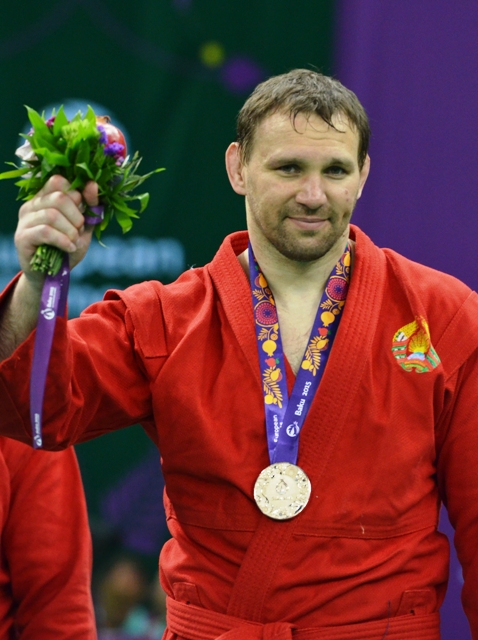
Yuri Rybak
http://www.noc.by
A three-time world champion, Belarusian sambo and judo wrestler, member of the national team of Belarus since the late 1990s; a silver and bronze medalist of the world judo championships, bronze medalist of the European Championship, participant of two summer Olympic games; a representative of Minsk Region at competitions; Honored Master of Sports of the Republic of Belarus.
Born on March 6, 1979 in the city of Dzerzhinsk, Minsk Region.
Women
Gold medals:
Tatiana Matsko, weight category up to 60 kg

Tatiana Matsko
http://izsambo.by
She is the master of sports of international class; training under the leadership of Alexander Bardin, her first coach was Vera Korolenko. During her sporting career, the athlete won many awards, including the gold of the European Championship, the gold of the 2016 World Cup and many other awards.
Also, Tatiana elegantly won the first prize at the open championship of Belarus and received a special prize for the “Best Technique”.
Born in Grodno.
Silver medals:
Olga Namazova, weight category up to 68 kg
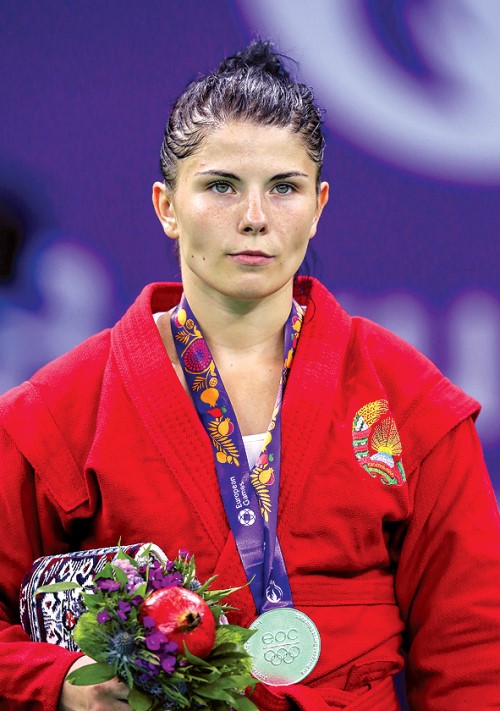
Olga Namazova
https://www.sb.by
Born on July 30, 1991 in Minsk region.
Bronze medals:
Ekaterina Prokopenko, weigh category up to 60 kg.
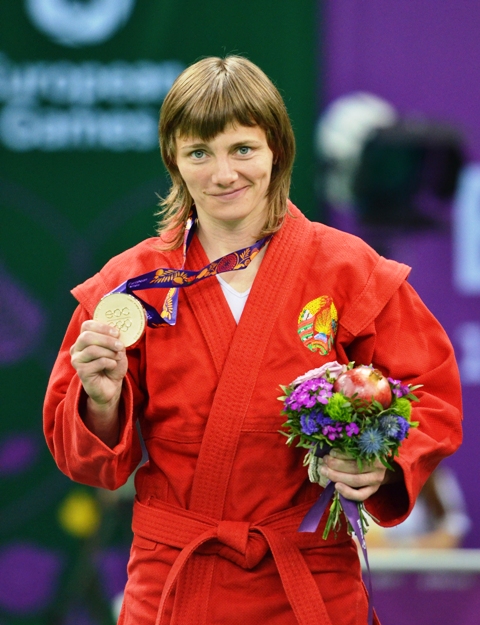
Ekaterina Prokopenko
Magazine Наш спорт
A two-time world champion, three-time European champion.
Born on June 27, 1980 in Baranovichi.
Books:
- Астахов, А. М. Самбо для женщин / А. М. Астахов, И. И. Тищенков, В. В. Извеков. – Саранск : Морд. кн. изд-во, 1991. – 156 с.
- Классическая борьба, вольная борьба, борьба самбо : программа / Чемпионат Европы по борьбе. Ленинград. Дворец спорта "Юбилейный". 15-23 апр. 1976. – Москва : Физкультура и спорт, 1976. – 79 с.
- Кто есть Кто в Республике Беларусь. Спорт = Who is Who in the Republic of Belarus. Sport : Энциклопедия / Под ред. И.В.Чекалова. – Мн. : Минсктиппроект, 1999. – 253 с.
- Самбо для женщин / А. М. Астахов, И. И. Тищенков, В. В. Извеков. – Саранск : Мордов. кн. изд-во, 1991. – 156 с.
- Самбо – наша жизнь : 70 лет самбо. – Минск : Харвест, 2008. – 35 с.
- Чемпионат мира по борьбе, 10―21 сентября, Дворец спорта, Минск = Championnat du monde de lutte = World wrestling championship : классическая борьба, вольная борьба, борьба самбо : программа / [сост. Г. В. Хачкованян]. – М. : Физкультура и спорт, 1975. – 119 с.
Articles from periodicals:
- Попов С. «Я так воспитан, что честь и достоинство ¬– не просто слова в моем лексиконе» / Степан Попов ; беседовала О. Самойлович // Наш спорт. – 2015. – № 8. – С. 22–23.
- Тимошенко, С. «Для меня самбо уже давно больше, чем работа…» / С. Тимошенко // Наш спорт. – 2018. – № 12. – С. 20–21.
- Товарищи без оружия // Белорусская федерация борьбы. – [Минск, 2012?]. – С. 16–24.
- Шире круг // Наш спорт. –2017. – № 6. – С.28-29.
- Первые Европейские мирового значения… // Наш спорт. –2015. – № 6. – С. 3–7.
Posters:
- Самбо, 21 февраля 2004 г. [Изоматериал] : Междунар. турнир по самбо на призы Президента Респ. Беларусь : [Плакат] / М-во спорта и туризма Респ. Беларусь [и др.]. – Минск, 2004. – 1 л.
Articles from electronic media:
- Белорусские борцы завоевали 25 медалей на молодежном чемпионате Европы по самбо [Электронный ресурс] // ООО «ТРАЙПЛ». – Режим доступа: http://triple.by/news/novosti/belorusskie-borcy-zavoevali-25-medaley-na-molodezhnom-chempionate-evropy-po-sambo.– Дата доступа: 29.03.2019.
- Гродненка Татьяна Мацко стала чемпионкой мира по борьбе самбо [Электронный ресурс] // Информационный портал города Гродно. – Режим доступа: https://newgrodno.by/sports/grodnenka-tatyana-matsko-stala-chempionkoj-mira-po-borbe-samb. – Дата доступа: 26.03.2019.
- Вячеслав Кот: слова этого вашего Баркли в любом случае неспортивны по сути [Электронный ресурс] // Прессбол. – Режим доступа: https://www.pressball.by/articles/others/digest/69663 – Дата доступа: 5.04.2019.
- История турнира [Электронный ресурс] // Президентский спортивный клуб «Побеждаем вместе». – Режим доступа: http://www.sportclub.by/otkritiy-chempionat-po-sambo/istoriya-turnira.html. – Дата доступа: 26.03.2019.
- Общественное объединение «Белорусская федерация самбо» [Электронный ресурс] // Международная федерация самбо. – Режим доступа: https://sambo-fias.org/ru/federations/european-sambo-federation/republic-organization-byelorussian-sambo-federation/ – Дата доступа: 25.03.2019.
- Ощепков Василий Сергеевич [Электронный ресурс] // Мы родом из самбо. – Режим доступа : http://izsambo.by/lichnosti/oshchepkov-vasiliy-sergeevich.html– Дата доступа: 20.03.2019.
- Спиридонов Виктор Афанасьевич [Электронный ресурс] // Мы родом из самбо. – Режим доступа: http://izsambo.by/lichnosti/spiridonov-viktor-afanasevich-.html– Дата доступа: 20.03.2019.
- Харлампиев Анатолий Аркадьевич [Электронный ресурс] // Мы родом из самбо. – Режим доступа: http://izsambo.by/lichnosti/anatoliy-kharlampiev.html– Дата доступа: 20.03.2019.
- Станцуем самбо на ковре [Электронный ресурс] // СБ. Беларусь сегодня. – Режим доступа: https://www.sb.by/articles/stantsuem-sambo-na-kovre-.html. – Дата доступа: 26.03.2019.
- Рейтинговые списки на II Европейские игры – 2019 [Электронный ресурс] // European Sambo Federation. – Режим доступа: http://eurosambo.com/press/news/2019/1577. – Дата доступа: 3.04.2019.
- Рейтинговые списки на II Европейские игры – 2019 [Электронный ресурс] // European Sambo Federation. – Режим доступа: http://eurosambo.com/competitions/2019/350. – Дата доступа: 3.04.2019.












